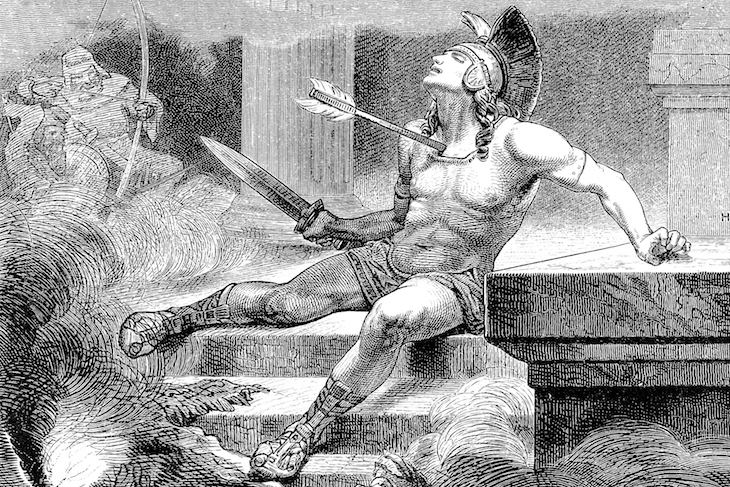In his robust new biography of Alcibiades, David Stuttard describes how the mercurial Greek general shocked his contemporaries by adopting Persian customs:
Certainly, he embraced their lifestyle, tying his hair up in a bun, curling his well-oiled beard (a symbol of machismo in the Persian court), dousing himself in the perfumes for which Sardis was so famous, and dressing not just in sumptuous robes and beautifully fringed tunics of linen, wool and mohair (deep-dyed in vibrant reds and vivid yellows, and adorned with ornaments in glittering gold foil), but in those other garments so associated by Athenians with decadent, eastern effeminacy: trousers.
I’ll be honest. After reading this showcase sentence, I glanced with new eyes at the pair of Olive Spoke Fives that I happened to be wearing. Because I had assumed that, with their jean cut and chunky brass rivets, these were as manly a pair of strides as money could buy. I wasn’t wrong — but I was forced to accept that, if I were somehow transported back in time to 5th-century BC Greece, my Spokes would seem a gratuitous affectation. And it made me realise what an ocean of difference separates us from the Athens of Alcibiades.
This was a society whose days began and ended at sunrise and sunset. No sailor would embark on a voyage of any length without first pouring libations of red wine and singing appropriate songs. Sexual relationships between adult males and adolescent boys — which are now seen as one of the last great taboos — were praised and even encouraged in Athens, on the grounds that they were conducive to the highest form of love. The point I’m making is that, if you’re trying to understand a 5th-century Athenian, you have to embark on a difficult mental voyage. And I’m not sure I’ve managed it. And I’m not sure that, for all the strengths and pleasures of Nemesis, Stuttard has, either.
By my best reading, the awful, irresistible Alcibiades was a man trapped in permanent adolescence. An aristocrat with a popular touch, he was notorious even as a child for his blend of beauty, vanity and violence. Writing half a millennium later, the historian Plutarch records a clutch of anecdotes that make the boy seem grippingly ghastly. In one, he bit an opponent during a wrestling bout, and was accused of fighting like a girl. ‘No!’ he declared in reply. ‘I fight like a lion!’ Or there was the time he punched a schoolteacher in the face for not happening to have with him a certain book of Homer.
He carried these qualities into adulthood. As one of the leading generals in the Peloponnesian War, which undermined the Athenian empire, Alcibiades was stronger on soundbites than insights, favouring the lightning strike over the long campaign. Dazzlingly handsome, compulsively competitive, he had a reputation as a prankster and a piss artist. When, on the eve of the Sicilian expedition in 415, Athens’s revered herms — religious pillars with ostentatiously protruding genitals — were vandalised, their faces and penises chopped off, it was assumed that Alcibiades must have had a hand in it. There was no proof of this, but it was the sort of thing he did.
If his contemporaries were in two minds about him, what chance do we have of reaching a single view? Yet I was still disappointed to find that, after reading Nemesis, I was little the wiser about what Alcibiades wanted out of life, or why anyone put up with him. Stuttard buys into Plutarch’s theory — which only takes us so far — that his subject was a chameleon: a man who altered his dress and demeanour to suit his circumstances. So in Athens, he was the dandyish nobleman, trailing clouds of perfume. Later, after he switched sides and joined the Spartans, he grew his hair long, shaved his upper lip, and took a lot of cold baths. Later still, as we have seen, he went full Persian.
Alcibiades was twice condemned to death in absentia — first by the Athenians, then by the Spartans. That takes some doing. Finally, he was assassinated by the Persians, deep in Asia Minor, far from home. He awoke in his tent to discover it was on fire. Rising naked from the bed he shared with his mistress, he wrapped a blanket around his forearm as a makeshift shield, snatched up a dagger, and shrieking madly, dashed out into the darkness to confront his assailants. Alcibiades — turncoat, lady-killer, demagogue, chameleon, kid — fell beneath a storm of arrows. Like the herms he had once been accused of defacing, his lifeless body was decapitated, and his handsome head, now drained of blood, was carried to the Satrap as proof of his death.
To anyone looking for a readable introduction to the Peloponnesian War, I would recommend Stuttard’s book. If you want to understand the morals and motivations of Alcibiades, I’ll have to qualify that. By all means, check it out. But before you do, I’d advise you to pour libations and sing appropriate songs. You might also want to take off your trousers.






Comments